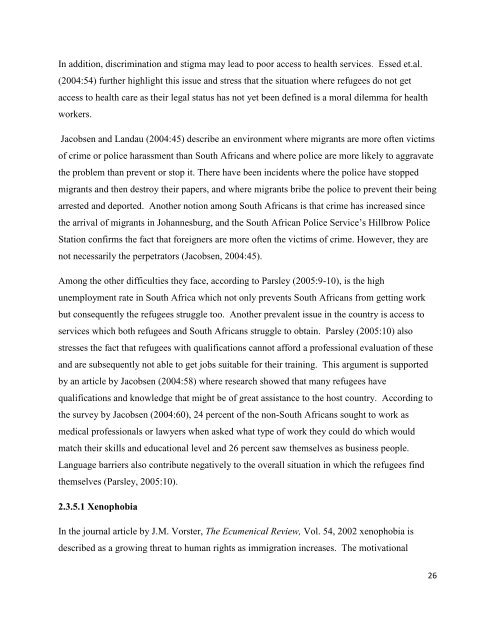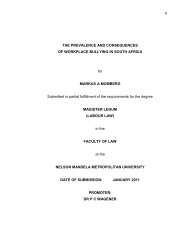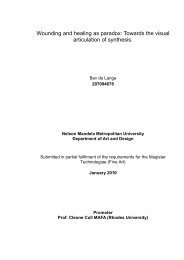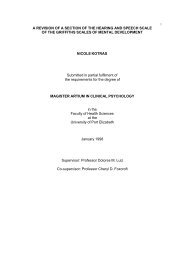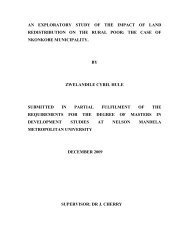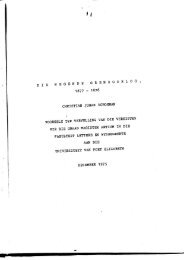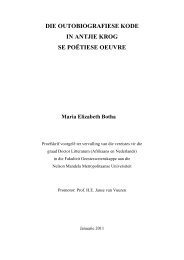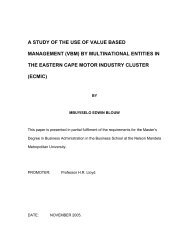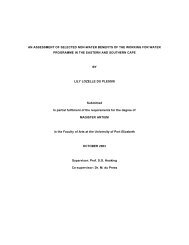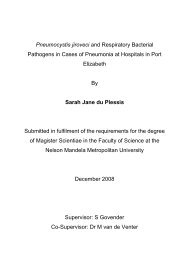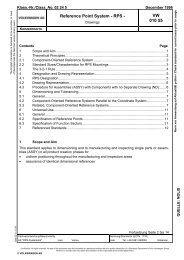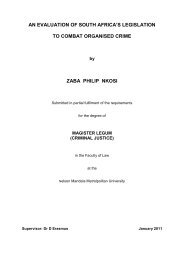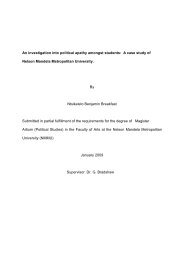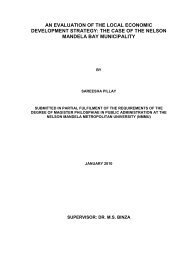Guro Lauvland Bjorknes.pdf - NMMU
Guro Lauvland Bjorknes.pdf - NMMU
Guro Lauvland Bjorknes.pdf - NMMU
You also want an ePaper? Increase the reach of your titles
YUMPU automatically turns print PDFs into web optimized ePapers that Google loves.
In addition, discrimination and stigma may lead to poor access to health services. Essed et.al.<br />
(2004:54) further highlight this issue and stress that the situation where refugees do not get<br />
access to health care as their legal status has not yet been defined is a moral dilemma for health<br />
workers.<br />
Jacobsen and Landau (2004:45) describe an environment where migrants are more often victims<br />
of crime or police harassment than South Africans and where police are more likely to aggravate<br />
the problem than prevent or stop it. There have been incidents where the police have stopped<br />
migrants and then destroy their papers, and where migrants bribe the police to prevent their being<br />
arrested and deported. Another notion among South Africans is that crime has increased since<br />
the arrival of migrants in Johannesburg, and the South African Police Service‟s Hillbrow Police<br />
Station confirms the fact that foreigners are more often the victims of crime. However, they are<br />
not necessarily the perpetrators (Jacobsen, 2004:45).<br />
Among the other difficulties they face, according to Parsley (2005:9-10), is the high<br />
unemployment rate in South Africa which not only prevents South Africans from getting work<br />
but consequently the refugees struggle too. Another prevalent issue in the country is access to<br />
services which both refugees and South Africans struggle to obtain. Parsley (2005:10) also<br />
stresses the fact that refugees with qualifications cannot afford a professional evaluation of these<br />
and are subsequently not able to get jobs suitable for their training. This argument is supported<br />
by an article by Jacobsen (2004:58) where research showed that many refugees have<br />
qualifications and knowledge that might be of great assistance to the host country. According to<br />
the survey by Jacobsen (2004:60), 24 percent of the non-South Africans sought to work as<br />
medical professionals or lawyers when asked what type of work they could do which would<br />
match their skills and educational level and 26 percent saw themselves as business people.<br />
Language barriers also contribute negatively to the overall situation in which the refugees find<br />
themselves (Parsley, 2005:10).<br />
2.3.5.1 Xenophobia<br />
In the journal article by J.M. Vorster, The Ecumenical Review, Vol. 54, 2002 xenophobia is<br />
described as a growing threat to human rights as immigration increases. The motivational<br />
26


